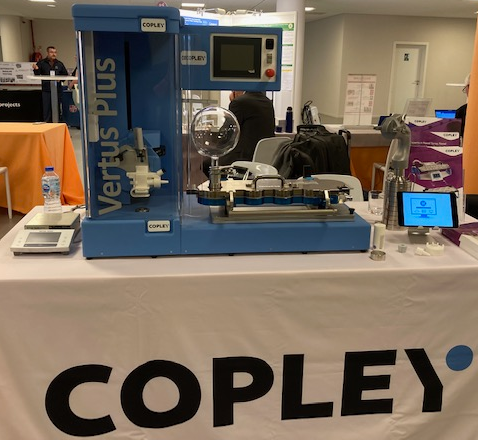In the technology exhibition, the focus on nasal delivery extended beyond spray pumps and other nasal delivery devices. Copley Scientific’s table, for example, featured instruments set up with accessories for nasal spray testing. Several CDMOs, including Recipharm, Renaissance and Upperton Pharma Solutions, promoted their nasal delivery expertise, along with first-time exhibitor Rubicon Research, which offers nasal product development and manufacturing services.
Biologics for inhalation
Nasal vaccines represented only one aspect of the interest in biologics at RDD Europe 2023. Although the meeting lacked a knowledge space dedicated to the topic, several workshops focused on inhaled biologics, including “Navigating New Technologies for Inhaled Product Development to Meet the Challenges of Small and Large Molecules” presented by Intertek; “An Overview of Lipid Nanoparticle Based mRNA Formulations for Inhaled Delivery” presented by Recipharm; and “Spray-Drying Process Considerations for Inhaled Biotherapeutic Dry Powders” presented by Lonza.
Additionally, in the Posters on the Podium session, Rebecca Rittersberger of the University of Applied Sciences Biberach presented her poster on “Evaluation of a Novel Porcine Trachea Cell Airway Model for the Screening of Excipient Toxicity used in Biopharmaceutical Inhalation Products.”
At an evening meeting of the AAPS Inhalation and Nasal Community, John Patton delivered a talk to about 60-70 attendees describing his, “Journey to Deliver Biologics to the Lung: 37 Years of Delivering Inhaled Biologics.” Patton addressed technical and commercial challenges associated with delivering biologics via inhalation while recounting his history in the field. He started with his role in the development of inhaled human growth hormone at Genentech in the 1980s; through founding Inhale/Nektar to develop dry powder inhaled insulin in 1990; the successful development and commercial failure of Exubera; and later founding Dance Pharmaceuticals/Aerami to develop liquid inhaled insulin.
In the workshop session, where Patton was one of the presenters for the Kindeva Drug Delivery / Meridian Medical Technologies workshop on “From Rapid Feasibility to Sustainable Products: Identifying the Right Inhalation Delivery System for Your Drug,” he again addressed some of the issues around selecting the best inhaled dosage form for biologics. Kindeva acquired Patton’s iPharma Labs in 2022 and later that year announced that it would merge with Meridian.
Various companies promoted both dry powder devices and nebulization devices for the delivery of biologics at the meeting. Hovione and H&T Presspart, for example, partnered on a workshop titled “Integrated Development for Capsule-based DPIs – Solving New Challenges,” which included discussion of the challenges of dry powder biologics, including the large payloads necessary. The workshop also reviewed development of the new Sunriser DPI platform for delivery of “delivery of higher doses of cohesive and sensitive powders.”
Alternative Bioequivalence Approaches
In September 2022, functional respiratory imaging company Fluidda and Nanopharm announced that they had teamed up to help ANDA sponsors pursue an alternative approach to bioequivalence that would help them avoid the time and expense of having to do clinical endpoint studies. At RDD Europe 2023, the two companies highlighted their approach in the “Advanced Inhalation: Data Driven Design” knowledge space, with Fluidda presenting a workshop titled, “Functional Respiratory Imaging: A Tool to Understand Regional Airway Exposure to Inhaled Drugs as Part of the Regulatory Process for Complex Generics” and Nanopharm‘s Will Ganley presenting a talk on “Alternative Bioequivalence Approaches: Combining In Vitro and In Silico Models to Demonstrate BE of Orally Inhaled Drug Products.”



